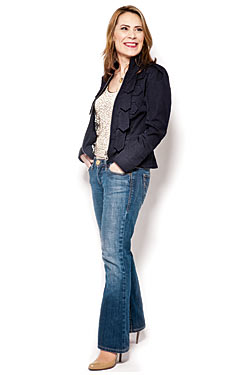
I ’m big on meat, so I’m going to try to get some meat,” J. C. Davies says, laying down the menu at BCD Tofu House in Koreatown, which is, unsurprisingly, heavy on the bean curd. “My Korean friend told me about this place. The Koreans do the best barbecue.” She hails a waitress, a fiftyish Korean woman with limited English, whose name tag improbably declares her to be “Jessica” (my name, incidentally, as well as J.C.’s—the initials stand for Jessica Celeste). After some deliberation, Davies orders us short ribs and pork. “I love pork,” she says. “Every time I’m not eating with a Jew I try to get some pork in.”
Most highly educated Americans of indeterminate European origin would avoid dropping terms like “the Koreans” and “Jew” into a first-time conversation, never mind delineating what people of these ethnic groups do or do not do. Not Davies, a 42-year-old former Goldman Sachs analyst, whose new book on interracial dating, I Got the Fever, is a treasure trove of sweeping generalizations and alleged cultural truisms. Among them: “Most Latinos are undeniably great dancers” and “overall, sex is one thing—apart from accounting—at which Jewish men really excel.” Davies wrote the book after losing her job in the financial crisis and started a publishing company to produce it. Fever has raised eyebrows, particularly after NPR’s “Tell Me More” had Davies on to discuss dating during the recession, giving her the opportunity, as Jezebel later wrote, “to knit together her ethnic with her fiscal stereotypes and make a cute little stereotype sweater.” (Dating while unemployed is “just not something” an Asian or an Indian would do, Davies said during the broadcast.)
“Stereotypes, racist—all those words do is shut down the conversation,” she says now. “They make people afraid. We can never talk about race because anything to do with race is wrong.”
Anyway, Davies says—as Jessica, the waitress, arrives with a plate of glistening pork—she was just telling the truth. “There’s cultural norms, and there’s stereotypes. That’s a cultural norm.” She shakes her head in exasperation. “You ask any Asian person, and they’re going to agree with me, but you put it on the page, you say it on the radio, and it’s a stereotype.”
Like lots of people who attempt to navigate this minefield, Davies has good intentions. Growing up in California, she was mystified by the invisible line separating her from her high-school crush, the school’s black quarterback, and the school’s handful of other African-American students. “I remember thinking how neat it would be to date people of other cultures,” Davies says. “But it was something that we really never talked about.” Later, she married and divorced a Latino man, got a degree at Berkeley, then Harvard, then moved to New York, where she approached dating and friendship the way other transplants do the city’s array of cuisines. “I’m an aficionado of other cultures,” she says. “I think differences make people more interesting to be around.”
Though the book, which had its launch party last Thursday, has its thoroughly repellent moments (“Indian men, especially the ones who eat a lot of traditional food, can be—I am sorry, there is no nice way to say this—a bit smelly”), it’s more nuanced than its title implies. Davies’s exploration of what it’s like to date men from different ethnicities is organized by chapter: “Salsa Fever” (Latin), “Yellow Fever” (Asian), “Shiksa Fever” (Jewish), “Curry Fever” (Indian), and “Jungle Fever” (must we say?). She researched the book using the same methods she applied as a Wall Street analyst: She called everyone she knew and extracted information. Though the resulting collection of anecdotes and advice from “hundreds of people,” of varying ethnicities, in their own voices, isn’t how we want to believe Americans think and talk about race, it’s probably a pretty accurate picture of how people in a country so messed up that Korean waitresses may or may not feel comfortable using their given names really do think and talk.
But as with the guy who stands up on the subway and shouts, “We’re all going to die!,” such radical honesty can sometimes be difficult to be around.
Jessica, the waitress, comes back to show us exactly which condiments to put on our lettuce wraps and in what order. “We have to follow the instructions,” Davies singsongs after she leaves, adding knowingly: “The Koreans are a little bit more demanding than some of the other cultures.”
“Look, the book is not a scientific analysis,” she says. “I’m not a professor. I didn’t want to do a book like that, because when you boil it down to the study, you lose all of the … there’s a phrase we use on Wall Street, ‘color.’ You lose all the color.”
Davies suspects the furor over her book will probably prevent her from being reemployed in her old industry. “I don’t think I could go back now,” she says. “Who would hire me?” But she’s maintained her friends from work, and a lot of them appear in the book. None of them is on the cover, though. The multihued group of men that appear there, buff and shirtless around a red-frocked Davies, are all models. “People in finance don’t get naked,” she says. “That’s almost true across the board.”
Have good intel? Send tips to intel@nymag.com.